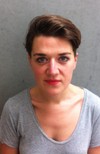Background via Pixabay, collage by VICE Staff.
A few years ago, I was working cover shifts at an online women’s magazine. In a move that was as rash as it was lazy, I tweeted my temporary ‘work’ email address, expecting story ideas, invitations and, in all likelihood, 22 press releases about bathroom cleaners ("Hi Nell, I just wanted to give you a heads up about the gorgeous new Tilex ‘save every drop’ lemon spray!") and novelty work-out regimes (“Let us know if you need any further images of Denise Welch’s new whole-body cryotherapy Zumba DVD!”)What I got, however, was an email from a man whose name was Nick. After a quick stalk of his Twitter profile, I discovered that he had once worked for the UN High Commission for Refugees.“Hi Nell,” he wrote. “Hope you’re well. I work in PR and I wondered if you’d be interested in visiting Calais to meet refugees, specifically refugees from Eritrea?”It was such a compassionate brief that I knew I had to do it. And, after a few quick emails, an editor at VICE had commissioned me. “Hello Nick,” I replied. “I am so pleased to get your email. I would absolutely love to. I’m free the first or third weekend of September?”When the weekend came, I travelled to the Calais Jungle, a refugee camp that existed close to the French port town until late 2016, when it was cleared by the French government. Nick and I spent 19 hours sitting, walking and talking beside each other. He stood quietly as I watched a maths lesson take place surrounded by flapping tarpaulin and dust in the camp’s makeshift school. He drank tea from an X Factor mug as a 19-year-old Eritrean man described walking through entire countries, being chased by dogs in Greece and his ambition to complete an engineering degree. We watched our shadows slide closer as we stood on a hill, looking out over this smudge of humanity trapped against a line of barbed wire, boulders and a cold, grey sea. We played ‘Shag, Marry, Kill?’ on a travel pack of Guess Who in the ferry gift shop on the way home. At the end of the weekend, Nick offered to take me for a debrief before I wrote the article. Why, I thought, do I never meet men like this?The debrief turned, somehow, into six glasses of wine, a lost handbag, a cab journey home, sex in the middle of a heavy period and a somewhat fuzzy awakening the next morning, in what looked like a murder scene. I rolled over, looked into Nick’s face and, for the very first time in my life, after knowing each other for just 24 hours, said, “I think I’m in love with you.” He didn’t flinch. He didn’t run. He didn’t even look away.Just over a year later, on a night train back from a holiday in Cornwall, I’m pretty sure our son was conceived. And the 19-year-old who showed us around the refugee camp in Calais with hopes of becoming an engineer? He’s now living and working in Germany. And is the godfather to our son.
Nell Frizzell’s book The Panic Years: Dates, Doubts and the Mother of all Decisions is out in May 2020.
Advertisement
As a female journalist, this was the sort of opportunity that I not only longed for but had realised fairly early on in my career, I’d have to create for myself. While editors looked at my male peers and thought ‘foreign correspondent’, ‘political opinion writer’ or ‘long form journalist’, those same editors seemed to look at me and immediately think, ‘lifestyle.’ It is a reductive gender-based generalisation that has nevertheless been present in some form in journalism for decades. Men are asked to write about wars, politics, technology, the environment, the economy, foreign diplomacy, humanitarian crises and sport. Women are asked to write about sex, relationships, their bodies, family, friendships, fashion, cooking and insecurities.But here, finally, someone was offering me the chance to write about something as topical and as complicated as the refugee experience. “I work with some Eritrean human rights activists all based in London because, well, you can’t really be one in Eritrea and expect respect/freedom/life,” Nick’s email explained. “They’re regularly going over to Calais to visit Eritreans in the Jungle. I wondered if you wanted to go with them to Calais to meet Eritreans and eventually write about them.”
Advertisement
Nell Frizzell’s book The Panic Years: Dates, Doubts and the Mother of all Decisions is out in May 2020.
